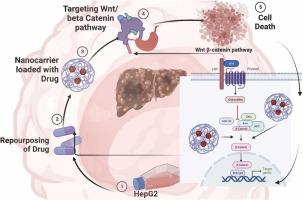Biomedicine & Pharmacotherapy ( IF 7.5 ) Pub Date : 2022-09-19 , DOI: 10.1016/j.biopha.2022.113713 Priyadarshini Mohapatra 1 , Natarajan Chandrasekaran 1

|
Liver cancer is the fifth most widespread in the world, with a high fatality rate and poor prognosis.However,surgicalresction,thermal/radiofrequencyablation,chemo/radioembolization and pathway targeting to the cancer cells are all possible options for treating Liver Carcinoma. Unfortunately, once the tumour has developed and spread, diagnosis often occurs too late. The targeted therapy has demonstrated notable, albeit modest, efficacy in some patients with advanced HCC. This demonstrates the necessity of creating additional focused treatments and, in pursuit of this end, the need to find ever-more pathways as prospective targets. Despite the critical need, there are currently no Wnt signalling directed therapy on the research field, only a few methods have progressed beyond the early stage of clinical studies. In the present study, we report that repurposing of drug previously licensed for other diseases is one possible strategy inhibit malignant cell proliferation and renewal by removing individuals protein expression in the Wnt/β-catenin pathway. Particularly β-catenin complex is present in Liver cancer, where tumour necrosis factor is indispensable for the complex formation and β-catenin interactions are disrupted upon drug in nano-carrier through nanotechnology. This study findings not only highlight that repurposing drug could improve liver cancer treatment outcomes but also focused to character traits and functions of the Wnt signalling cascade's molecular targets and how they could be used to get anti-tumour results method to targeting Wnt/β-catenin in liver carcinoma.
中文翻译:

Wnt/β-catenin 通过基于纳米技术的药物再利用靶向肝癌:综述
肝癌是世界第五大流行,死亡率高,预后差。然而,手术切除、热/射频消融、化疗/放射栓塞和靶向癌细胞的通路都是治疗肝癌的可能选择。不幸的是,一旦肿瘤发展并扩散,诊断往往为时已晚。靶向治疗在一些晚期 HCC 患者中显示出显着的疗效,尽管效果不大。这表明有必要创造更多的重点治疗方法,并且为了实现这一目标,需要找到更多的途径作为预期目标。尽管迫切需要,目前研究领域还没有 Wnt 信号定向治疗,只有少数方法取得了进展,超出了临床研究的早期阶段。在目前的研究中,我们报告说,重新利用以前许可用于其他疾病的药物是一种可能的策略,通过去除 Wnt/β-连环蛋白途径中的个体蛋白质表达来抑制恶性细胞增殖和更新。特别是在肝癌中存在β-连环蛋白复合物,其中肿瘤坏死因子对于复合物的形成是必不可少的,并且通过纳米技术在纳米载体中破坏了β-连环蛋白相互作用。该研究结果不仅强调了再利用药物可以改善肝癌治疗结果,而且还关注 Wnt 信号级联分子靶标的特征和功能,以及它们如何用于获得靶向 Wnt/β-catenin 的抗肿瘤结果方法在肝癌中。



























 京公网安备 11010802027423号
京公网安备 11010802027423号